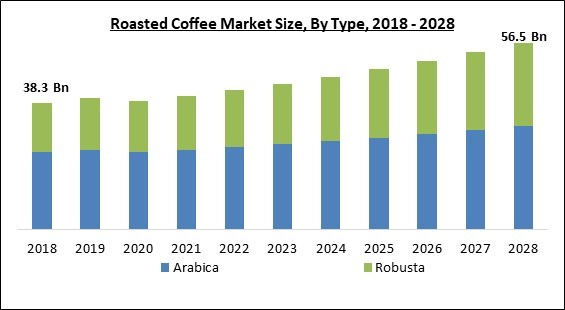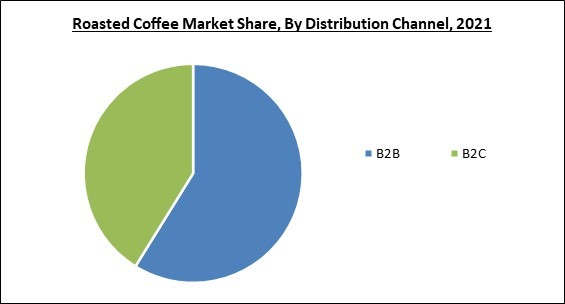The Global Roasted Coffee Market size is expected to reach $56.5 billion by 2028, rising at a market growth of 5.0% CAGR during the forecast period.
To produce flavorful and fragrant coffee, green coffee beans must be transformed into brown beans via the roasting process. The beans undergo significant chemical changes due to the entire metamorphosis that occurs when their internal temperature increases. The sugar in the beans is also caramelised after cooking, giving them their distinctive brown color.
The green beans appear like jade and smell like just cut grass before being cooked. Many coffee roasting methods, styles, and tactics are used to enhance and extract rich flavors and distinctive fragrances. But the key factors are high temperatures (between 350 and 500 degrees Fahrenheit), changing airflow, continuous visual inspection, and auditory fractures. The roaster employs all of their senses, including their sight, hearing, and nose, to determine the beans" ultimate roast character.
A revolving drum receives the unroasted coffee beans placed into loaders. A preheated temperature of approximately 240 degrees is applied to the drum. The roasted beans will leave the drum at around 195 degrees after 12 to 15 minutes, depending on the roast, and are then transferred to a cooling tray at the front of the roaster. After being run through a machine to remove any stones or debris, they are examined by hand for flaws before being packed for sale and allowed to cool fully.
The majority of roasters give their flavored roasts specific names. There are four roast categories: light, medium, medium-dark, and dark roasts. This might not be very clear while shopping. The fact is that lighter roasts contain more caffeine than darker roasts, despite the common misconception that darker roasts" robust, rich flavor suggests a more significant dose of caffeine. While the acidity will be prominent in light and medium roasts, the bitterness will be significant in medium-dark and dark roasts. The ideal roast is a subjective decision that may sometimes be shaped and defined by regional and national tastes.
The market research report covers the analysis of key stake holders of the market. Key companies profiled in the report include Nestle S.A., Starbucks Coffee Company, JDE Peet"s N.V., Tchibo GmbH (maxingvest ag), LUIGI LAVAZZA S.p.A., Strauss Coffee B.V. (Strauss Group Ltd), The J.M Smucker Company, UCC Ueshima Coffee Co., Ltd. (UCC Holdings Co., Ltd.), Massimo Zanetti Beverage Group S.p.A and Melitta Group
To produce flavorful and fragrant coffee, green coffee beans must be transformed into brown beans via the roasting process. The beans undergo significant chemical changes due to the entire metamorphosis that occurs when their internal temperature increases. The sugar in the beans is also caramelised after cooking, giving them their distinctive brown color.
The green beans appear like jade and smell like just cut grass before being cooked. Many coffee roasting methods, styles, and tactics are used to enhance and extract rich flavors and distinctive fragrances. But the key factors are high temperatures (between 350 and 500 degrees Fahrenheit), changing airflow, continuous visual inspection, and auditory fractures. The roaster employs all of their senses, including their sight, hearing, and nose, to determine the beans" ultimate roast character.
A revolving drum receives the unroasted coffee beans placed into loaders. A preheated temperature of approximately 240 degrees is applied to the drum. The roasted beans will leave the drum at around 195 degrees after 12 to 15 minutes, depending on the roast, and are then transferred to a cooling tray at the front of the roaster. After being run through a machine to remove any stones or debris, they are examined by hand for flaws before being packed for sale and allowed to cool fully.
The majority of roasters give their flavored roasts specific names. There are four roast categories: light, medium, medium-dark, and dark roasts. This might not be very clear while shopping. The fact is that lighter roasts contain more caffeine than darker roasts, despite the common misconception that darker roasts" robust, rich flavor suggests a more significant dose of caffeine. While the acidity will be prominent in light and medium roasts, the bitterness will be significant in medium-dark and dark roasts. The ideal roast is a subjective decision that may sometimes be shaped and defined by regional and national tastes.
COVID-19 Impact Analysis
Because of the interruption to the supply chain and distribution channels caused by the COVID-19 pandemic, the food and beverage sector was particularly hard hit. Governments in several nations implemented travel restrictions and stay-at-home regulations throughout the COVID-19 outbreak as a precaution. The COVID-19 pandemic directly impacted coffee imports in 2020 throughout several areas, including the European Union, the United States, and Japan. As a result, the market saw a decline in sales due to limited output, disrupted supply chains, and lower demand.Market Growth Factors
Increased Consumption of Fresh Coffee
According to estimates, as consumer demand for flavorful, aromatic, and fresh coffee rises, so will the market for coffee roasting equipment. This is primarily because freshly roasted coffee has so many benefits, including the fact that it is loaded with antioxidants and minerals that boost immunity and enhance overall health by avoiding cancer and other dangerous illnesses.Coffee has been shown to have positive effects on heart health
Heart damage or cardiac weakness may result from heart disorders such as heart attacks, strokes, and coronary artery disease (CAD). Heart disease is thus regarded as one of the major global causes of death. The components in coffee, including magnesium, lignans, trigonelline, quinides, caffeine, and phenolic compounds, have all been shown to enhance heart health.Market Restraining Factor
Coffee"s drawbacks lead to lower consumption
Regular coffee use might cause annoyance and anxiety. The exact quantity could no longer be pleasurable for other individuals who are sensitive to what it does to their bodies over time. It may also affect sleep patterns and elevate blood pressure. Many individuals like the taste, scent, and energetic effects that a cup of coffee in the morning provides, while others despise these features. For people who have headaches or trouble sleeping due to their coffee use, switching to decaffeinated or low-caffeine coffee products may be a solution.Type Outlook
Based on type, the roasted coffee market is classified into Robusta and Arabica. The robusta segment generated the significant share in the roasted coffee market in 2021. One of the main factors influencing the segment"s quicker expansion in the next years is the rising consumption of robusta because of its intense and robust taste.Distribution Channel Outlook
Based on Distribution Channel, the roasted coffee market is split into B2B and B2C. The B2B segment garnered the highest revenue share in the roasted coffee market in 2021. The more significant sector share is related to the product"s predominant usage in cafés and restaurants. Due to the increasing number of cafés and coffee shops, the product"s sales are increasing globally.B2C Outlook
Further, the B2C distribution channel is divided into hypermarkets & supermarkets, convenience stores, online, and others. Hypermarkets & Supermarkets accounted for the largest revenue share in the roasted coffee market in 2021. The convenience this distribution channel offers accounts for the segment"s rise. Additionally, the market in this sector is expanding due to the extensive availability of a wide variety of roasted coffee with varying prices and brands that provide buyers with a wide range of alternatives.Regional Outlook
Based on region, the roasted coffee market is classified into North America, Europe, Asia Pacific, and LAMEA. Europe dominated the roasted coffee market in 2021 with the largest revenue share. This is because the majority of coffee consumed worldwide is in Europe. As a result, the area is growing due to the increasing consumption of roasted coffee and customers" growing interest in robusta and arabica coffee. In the following years, it is anticipated that rising per capita income, changing coffee habits, and rising coffee consumption will boost the regional market.The market research report covers the analysis of key stake holders of the market. Key companies profiled in the report include Nestle S.A., Starbucks Coffee Company, JDE Peet"s N.V., Tchibo GmbH (maxingvest ag), LUIGI LAVAZZA S.p.A., Strauss Coffee B.V. (Strauss Group Ltd), The J.M Smucker Company, UCC Ueshima Coffee Co., Ltd. (UCC Holdings Co., Ltd.), Massimo Zanetti Beverage Group S.p.A and Melitta Group
Strategies Deployed in Roasted Coffee Market
- Mar-2022: Massimo Zanetti Beverage USA has expanded its geographical footprint in Virginia, US. The company expanded, continuing the operation of its business with an aim of future growth in the region.
- Jul-2021: Nestlé collaborated with Starbucks Corporation, an American multinational chain of coffeehouses and roastery reserves. This collaboration is aimed to bring Starbucks Ready-to-Drink (RTD) coffee beverages choose markets across Latin America, Southeast Asia, and Oceania. Additionally, Nestle would take advantage of new development opportunities in the coffee segment.
- Apr-2021: Nestlé announced the launch of the Nescafé Gold Blend Roastery Collection, a super-premium Nescafé that delivers new tastes through roasting innovation. The product consists of barista-style soluble coffees that develop Nescafe"s unique specialization in roasting technology to provide the latest taste profiles.
- Feb-2020: Nestlé unveiled Starbucks® premium instant (soluble) coffee; the latest spectrum comprises Medium Roast and Dark Roast coffees, with a variety of coffee beverages and a tea latte. The products consist of the heritage and unrivaled expertise of Nestlé in the instant coffee segment.
- Jan-2020: Nestlé launched Roastelier on-site coffee-roasting solution, a product equipped with a QR code reader that identifies the coffee type. The product delivers a spectrum of roasting profiles defined by Nestlé and programmed into its database. Moreover, the company aims to put baristas at the heart of the craft, opening up innovative avenues for them to gratify their customers and earn larger value from their businesses.
- Oct-2019: Massimo Zanetti Beverage Group acquired Café Pacaembu, a Brazilian coffee company. This acquisition strengthens Massimo Zanetti Beverage Group"s position in Brazil.
- Sep-2019: The J.M. Smucker Co. launched Folgers Noir, a new suit of extra dark roasted coffee made with 100% Arabica coffee beans. The product is developed specifically for coffee fans pursuing dark-roasted, complex coffee; Folgers Noir coffees highlight a range of dark, yet soft roasts.
Scope of the Study
By Type
- Arabica
- Robusta
By Distribution Channel
- B2B
- B2C
- Hypermarkets/Supermarkets
- Convenience Stores
- Online
- Others
By Geography
- North America
- US
- Canada
- Mexico
- Rest of North America
- Europe
- Germany
- UK
- France
- Russia
- Spain
- Italy
- Rest of Europe
- Asia Pacific
- China
- Japan
- India
- South Korea
- Singapore
- Malaysia
- Rest of Asia Pacific
- LAMEA
- Brazil
- Argentina
- UAE
- Saudi Arabia
- South Africa
- Nigeria
- Rest of LAMEA
Key Market Players
List of Companies Profiled in the Report:
- Nestle S.A.
- Starbucks Coffee Company
- JDE Peet"s N.V.
- Tchibo GmbH (maxingvest ag)
- LUIGI LAVAZZA S.p.A.
- Strauss Coffee B.V. (Strauss Group Ltd)
- The J.M Smucker Company
- UCC Ueshima Coffee Co., Ltd. (UCC Holdings Co., Ltd.)
- Massimo Zanetti Beverage Group S.p.A
- Melitta Group
Unique Offerings
- Exhaustive coverage
- The highest number of market tables and figures
- Subscription-based model available
- Guaranteed best price
- Assured post sales research support with 10% customization free
Table of Contents
Chapter 1. Market Scope & Methodology
Chapter 2. Market Overview
Chapter 4. Global Roasted Coffee Market by Type
Chapter 5. Global Roasted Coffee Market by Distribution Channel
Chapter 6. Global Roasted Coffee Market by Region
Chapter 7. Company Profiles
Companies Mentioned
- Nestle S.A.
- Starbucks Coffee Company
- JDE Peet's N.V.
- Tchibo GmbH (maxingvest ag)
- LUIGI LAVAZZA S.p.A.
- Strauss Coffee B.V. (Strauss Group Ltd)
- The J.M Smucker Company
- UCC Ueshima Coffee Co., Ltd. (UCC Holdings Co., Ltd.)
- Massimo Zanetti Beverage Group S.p.A
- Melitta Group










